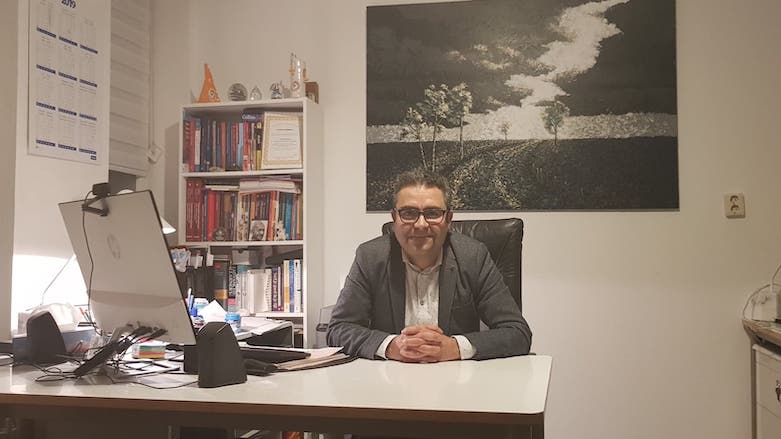Kurdish Dutch psychiatrist gains recognition for treating refugees with trauma

ERBIL (Kurdistan 24) – A Kurdish Dutch psychiatrist has gained recognition and fame in the Netherlands for being one of a few healthcare workers able to treat clients who are mainly Syrian refugees.
Aram Hasan, 47, is a Kurdish Dutch psychiatrist from Syrian Kurdistan (Rojava). Hasan has set up his own center in the Netherlands for cultural minorities suffering from mental illnesses.
Hasan himself has suffered a traumatic past. He was arrested and tortured in Syria in the past after the government discovered he worked for a Kurdish human rights organization.
At the time, he had finished a medical degree in Ukraine, which prompted his decision to flee to the Netherlands in 1999 with his wife and two kids.
After successfully graduating as a psychiatrist with a specialization in trauma in the Netherlands, and learning the Dutch language within a few years, he set up in 2012, offering support until the organization was replaced in 2017.
Psychiatrists Without Borders led many workshops in the Kurdistan Region, including at refugee camps in Domiz and Arbat, according to Hasan. The foundation also trained 30 civil servants in Diyarbakir on how “to deal with Syrian refugees that fled to Turkey.”
There is a huge demand for psychiatrists with different cultural backgrounds in the Netherlands. Dutch psychiatrists are often unable to treat refugees with issues like war trauma and post-traumatic stress disorder (PSTD), which leads to patients abandoning consultations after a few sessions.
Therefore, Hasan set up the Culturally Oriented Trauma Expertise Centre (Co-Team) that replaced Psychiatrists Without Borders. His focus was on refugees living in the Netherlands.
Hasan speaks Russian, Arabic, and Kurdish. Although he mostly has clients from Syria, some are from the Kurdistan Region, Iran, Iraq, Yemen, and even Russia.
“There is a lot of demand for cultural-orientated psychological treatment, so we can reach a lot of people. There are many approaches in the Western world that do not fit the needs of clients,” he told Kurdistan 24.
There is often a stigma associated with mental health issues in the Middle East, and people do not seek help for depression or anxiety.
“Psychological treatment also does not mean that someone is crazy. That’s a prejudice [from refugees] that we are trying to change,” Hasan explained. “The problem is that in the past there were not a lot of psychiatrists in our [Kurdish] region.”
“In the last few years, some have been educated in psychology, and I give training sessions to psychiatrists [in northern Syria] on a voluntary basis,” he continued. “I also travel to Syria and the Kurdistan Region often to organize conferences and workshops.”
Hasan is working on a project in Rojava with a university in Washington to set up a local training program for psychiatrists according to international standards.
At least 44,000 Syrian refugees came to the Netherlands between January 2014 to July 2016. With the influx of Syrian refugees to the Netherlands due to the Syrian civil war, Hasan gained more recognition in the Dutch media and was interviewed on issues of refugee integration and the Syrian crisis.
The Dutch program One Today called him the only Dutch Syrian psychiatrist in the Netherlands in 2017.
At the time, Hasan’s occupation led to questions in the Dutch parliament about whether or not there were enough psychiatrists available to deal with the refugee influx.
He has also received many calls from other colleagues and municipalities asking for advice and support.
Hasan has also developed a program for asylum seekers in the Netherlands and has given workshops in 12 cities.
“Because people find it difficult to find psychiatrists, I have developed a program with six meetings,” he explained. “At these gatherings, people get support for psychological problems, get better confidence, and tips on how to find support.”
Due to his success, Hassan was invited to the International Conference on Mental Health and Psychosocial Support (MHPSS) in Amsterdam in October 2019 hosted by Dutch Minister for Foreign Trade and Development Cooperation, Sigrid Kaag.
Today is a historic day, ‘a turning point’ that pays a lot of attention to mental and psychosocial support in conflict areas. @SigridKaag #MHPSS#MHPSSmatters#mindthemindnow#MHPSS #mentalhealth @koninginmaxima_ @Molff #NPORadio1 #CoTeam_MHC pic.twitter.com/6Epoo99F84
— د.آرام حسنAram Hasan (@DrAramHasan) October 8, 2019
Voices from the field
— د.آرام حسنAram Hasan (@DrAramHasan) January 22, 2020
Ministry of Foreign Affairs Blog
Aram Hasan is a Dutch psychiatrist with lived experience from Syria. He studied medicine in Ukraine. He came to the Netherlands as a refugee in 1999 and now helps people with similar backgrounds.#MHPSS #CoTeam @psychiaters pic.twitter.com/9F00Qspaf3
“I saw this as a recognition of my work in the Netherlands. I worked for many years and it was not easy to become successful [as a refugee].”
Due to the coronavirus pandemic, he is unable to treat patients in person. “Some of my clients want to meet face to face, but I tell them this is unnecessary since I work in a hospital. I could infect others, but people understand that,” Hasan told Kurdistan 24.
He is now trying to educate people in Syria about the coronavirus, officially known as COVID-19 through interviews with Kurdish radio stations and on social media.
The local Kurdish-led authorities in northeast Syria, meanwhile, have imposed several restrictions to prevent the spread of the highly contagious disease.
Despite the crisis, Hasan continues his work in the Netherlands and also supports his community back home in Syria.
Editing by Karzan Sulaivany
